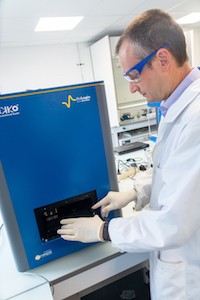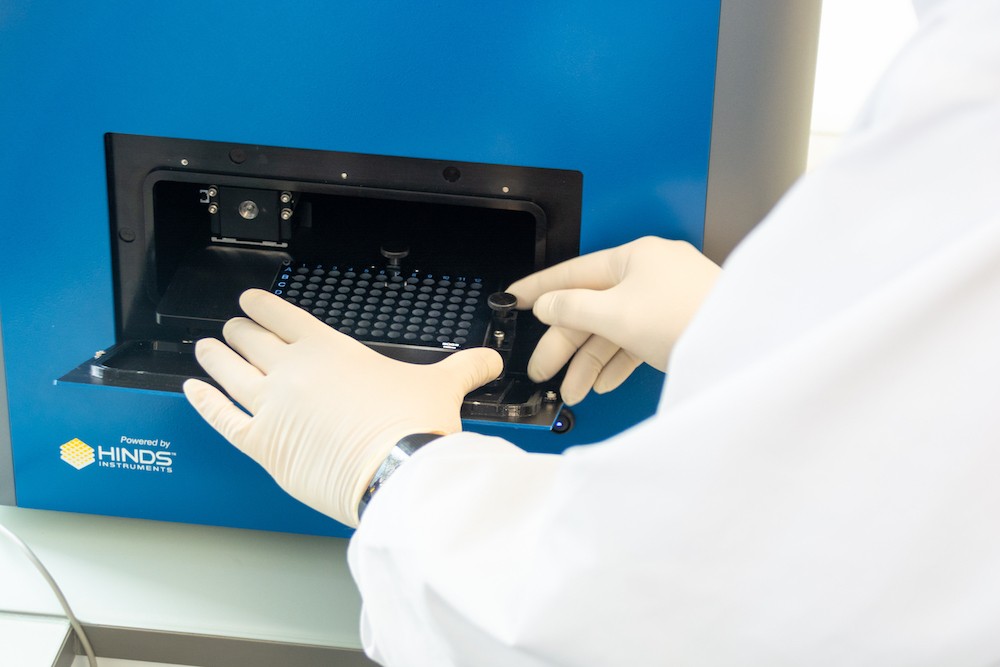Channels
Special Offers & Promotions
Bio-Logic & Hinds launch EKKO
 Breakthrough technology cuts screening time by 10 times compared to circular dichroism (CD) devices with auto samplers and is at least 100 times faster than standard HPLC processes.
Breakthrough technology cuts screening time by 10 times compared to circular dichroism (CD) devices with auto samplers and is at least 100 times faster than standard HPLC processes.
Bio-Logic (France) and Hinds Instruments (United States) are pleased to announce the launch of the EKKO®, the world’s first high throughput CD microplate reader. EKKO® demonstrates significant potential for the pharmaceutical industry and any organization working in the field of asymmetric synthesis, catalysis and organic/medicinal chemistry. This compact device can screen a 96 well plate in under two minutes, as opposed to several hours compared to a traditional CD spectrometer linked to an auto sampler. This exponential increase in speed could dramatically improve the efficiency of chiral R&D campaigns. Furthermore, the device is not just faster, but more cost-efficient. It uses 10 times less nitrogen than a standard spectropolarimeter with auto sampler and 4 times fewer samples at a comparable light path.
As well as being significantly faster than supercritical fluid chromatography (SFC) and high performance liquid chromatography (HPLC) protocols, the device is able to identify enantiomeric excess (ee) rates as well as yield resulting in data that can prove highly beneficial to the screening process. It is also more environmentally-friendly as it requires no solvents.
According to Hinds’ senior scientist Bob Wang: “This CD reader eliminates the time-consuming process of transferring the contents of each well of the micro-well plate into a cuvette, and cleaning between each measurement, as is necessary when using conventional CD spectrometers. Furthermore, by avoiding chromatography completely, EKKO® is well suited to identifying ‘hits’ quickly using high throughput screening.”
 A technological response to a clear market need
A technological response to a clear market need
The first commercially-available system of its kind, the device truly delivers on the promise of high-throughput screening for chiral pharmaceuticals. Cedric Georges, Product Manager (Bio-Logic) stated: “EKKO® is a technological response to help develop chirally pure pharmaceuticals. It is as easy to use as any standard fluorescence or absorbance microplate reader and can add significant value to any laboratory where rapid chiral analyses are needed. We have received excellent market feedback and an academic paper has already been published demonstrating the technology’s efficiency at determining enantiomeric excess during trials.
Professor Eric V. Anslyn co-author stated: “The EKKO system is the only instrument on the market that allows the direct reading of CD spectra and ellipticity values in 96 and 384 well plate formats. Thus, the handedness, and with proper standards and assays the enantiomeric excess of reactions can be read in parallel, thereby allowing very rapid assays for examining asymmetric reaction screening during high-throughput experimentation. Furthermore, because CD is the tool of choice for following protein folding, it enables the screening of pharmaceutical interactions with proteins in parallel, generating another approach to high-throughput lead discovery in the pharma industry”.
Chirality and drug purity: A regulatory challenge
Chirality is a property of many organic molecules that exist in at least two forms, which are mirror images (enantiomers) of each other. Drug interactions for the two enantiomers in biological systems can be thought of as a left and right hand, both trying to fit into a left glove. The left hand will be much more successful. In this way, usually only one of the two chiral enantiomers of a drug is therapeutically active. The other may be ineffective or even harmful. In nature only the active enantiomer is produced, but in the laboratory it is likely that a mixture of the two will form. As more is understood about the importance of the chiral properties of drugs, the FDA and other agencies have made increasing demands that drug companies fully separate, characterize and control the enantiomers they sell. But differences between the two enantiomers are chemically subtle, so separation and characterization are difficult. This has led to a requirement for more analytical methods that can differentiate between enantiomers and help pharmaceutical companies to provide quality control.
While CD instruments have been available for many years, they are all designed to measure the CD of a single reaction product at a time. The EKKO® is revolutionary in its ability to rapidly “read” the enantiomeric composition of 96 reaction products in a standard laboratory micro well plate which equates to thousands of readings per day. The device can therefore help reduce bottlenecks in the drug discovery process and the speed and efficiency of EKKO® makes the device ideally suited to parallel/combinatorial synthesis techniques where more test combinations can be carried out in less time.
Although EKKO® has been designed with evaluating enantiomeric excess in mind, the device is highly flexible. EKKO’s high-quality optics enable the device to work down to far UV at 185nm, making it suitable for the determination of secondary protein structures, for biotherapeutic development or formulation optimization.
Bio-Logic, a leading global designer and manufacturer of scientific instruments of high performance laboratory research instrumentation has been awarded an exclusive licence by HINDS Instruments to distribute the product via its global reseller network.
Media Partners



